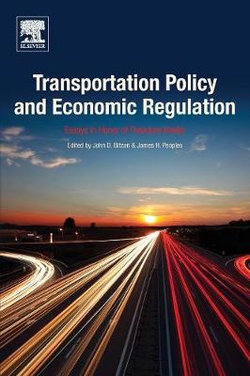Transportation Policy and Economic Regulation: Essays in Honor of Theodore Keeler addresses a number of today's important transportation policy issues, exploring a variety of transportation modes, and examining the policy implications of a number of alternatives. Theodore Keeler had a distinguished career in transportation economics, helping to shape regulatory policies concerning the transportation industries and assessing the appropriateness of various policies. A distinguishing feature of his work is that it always had policy implications. As a tribute to Theodore Keeler, this book examines transportation policy issues across a variety of transportation industries, including aviation, railroads, highways, motor carrier transport, automobiles, urban transit, and ocean shipping. The book evaluates the economic impact and effectiveness of various policies, employing empirical analyses and new estimation techniques, such as Bayesian analysis. The book is designed for transportation professionals and researchers, as well as transportation economics students, providing an in-depth analysis of some of today's important transportation policy issues.
Policy changes established in the last 35-40 years have introduced profound changes in the business environment of the transportation industry. Past policy changes promoted the free market's role in setting prices and determining service availability. While 21st century policy has focused on a variety of other issues, such as safety, road and air congestion, productivity growth, labor relations and exhaust emission, many still promote the role of competition.
In addition to examining various transportation policy issues in the U.S., the book explores some approaches to dealing with transportation issues in different parts of the world. Contemporary transportation policy debates have broadened from their initial focus of primarily examining the merits of reforming economic regulations at national levels, to now examining a variety of issues such as alternative methods of social regulation (such as safety regulation and emission controls), new approaches to changing economic regulations, the potential for reforming international regulations, and the appropriate role for government in transportation.




Share This Book: